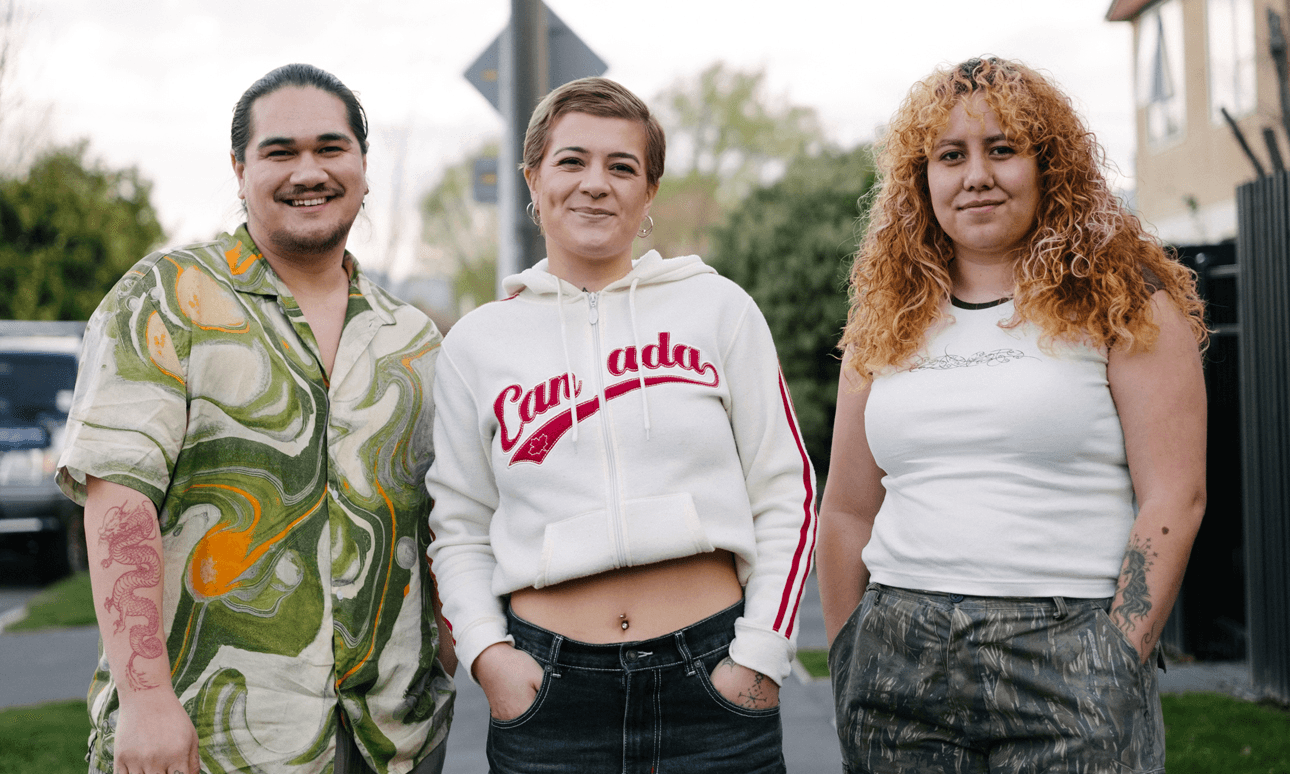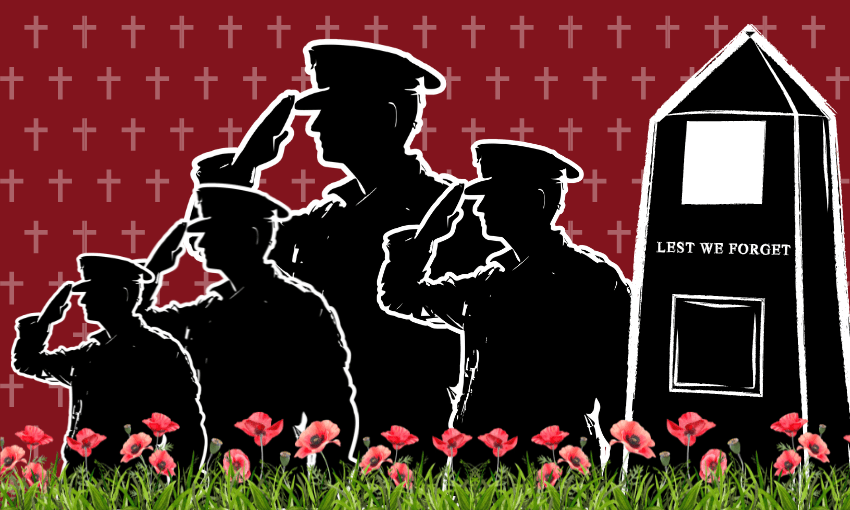The Pacific profiles series shines a light on Pacific people in Aotearoa doing interesting and important work in their communities, as nominated by members of the public. Today, Grace Colcord, Shea Wātene and Devyn Baileh, co-founders of Brown Town.
All photos by Geoffery Matautia.
Brown Town is an Ōtautahi community collective carving space for Tangata Moana to thrive. Between organising their Friday night supper party, co-founders Grace Colcord (Malie, Afega), Shea Wātene (Ngā Puhi, Ngā Rauru) and Devyn Baileh (Te Atiawa), sat down with me to discuss Brown Town’s origin story, the challenges of creating community spaces, and their deep love for Ōtautahi.
Thank you for inviting us to your dinner party. Can you each tell me a little bit about yourselves? Are you all from Ōtautahi?
Grace: I grew up in South Auckland (Manurewa) and then spent some time in London. My family moved to Christchurch while I was away so I came here a few years ago. I got a huge culture shock when I landed in the South Island. I’ve always been brought up in big bold communities and I’m one of 10 siblings. I don’t know why I thought it’d be like South Auckland, maybe because it had south in it [laughs]. I really turned into myself and didn’t have a community.
Devyn: I grew up in Kaikōura but moved here in 2011 just before the earthquakes. My experience of the city was pretty bleak and I wanted to get out as soon as possible. But I think my story is pretty common – typically I was the only brown face in the room, the only brown friend, all those things. It wasn’t until I left Christchurch that I really dove into my Māori side. When I moved back here – which I never thought I’d do – I settled into the mindset of ‘this is how it is and always will be.’ But then I met these guys and thought well, this isn’t how it has to be.
Shea: I was born and raised in Ōtautahi . I left when I was 18 and came back six years ago. Growing up, I was always the only brown person. It’s very white down here and it can feel like you don’t have a community.
How did you all find each other and form Brown Town?
Shea: We started Brown Town about two years ago. We were all at a mutual friend’s birthday party and somehow ended up in someone’s bedroom. We’d never really hung out, but we started talking and made a pact that we’d meet monthly to do things together. From there we just started bringing in more and more people. We took turns hosting at each other’s houses – paint and sip, cooking class, mid-winter Christmas, pot lucks, and a lot of creative things. We found a home in each other and realised the huge need for many more brown people living in Ōtautahi to have something like this. Last month we held our first official Brown Town event. It was a potluck with a Pacific trivia quiz.
Grace: Brown Town came from a need for a better sense of community and better representation of brown people in this city. When we were all in that bedroom, we magically felt a need for community, connection, and creativity.
As a collective, do you each have assigned roles?
Devyn: I do the social media and marketing. It’s a lot more fun than what Grace does [laughs].
Grace: I deal with strategy, our goals, funding, and boring governance stuff. I call myself a leader by surprise because I never really thought I’d be doing this.
Shea: Mine’s the most fun! I do event management and organisation. We’ll brainstorm ideas together and then I’ll do the logistics.
Tell me about your members – you’ve gained quite a following!
Grace: We speak mainly to Tangata Moana young adults around the ages of 18–35.
Shea: There are people outside of that, too. Anyone who feels they want to find community with other Tangata Moana is welcome.
Grace: Within the collective we have writers, curators, artists, and dancers. It’s cool because when we’re in the spaces of sharing knowledge we come from really different experiences and perspectives.
I know you’ve only just held your first official event, but what’s the response been like from the community so far?
Grace: People are hungry for it. So many were waiting for something to build people together.
Devyn: I’d look to other groups and think, “I wish there was something like that in Ōtautahi”, but then I realised that at my big age, it’s up to us!
Shea: What’s exciting was how many people asked, “ok when’s the next one?” So we gotta put our heads down and come up with a proper plan. We weren’t ready for the response.
What kinds of events do you offer or aspire to offer to your community?
Shea: Sharing kai! That’s a big one.
Devyn: We want brown people to have fun in Ōtautahi. When we used to go out, people would stare at us and we felt uncomfortable. We belong just as much as anyone else in this city, and we have a right to enjoy what this city has to offer.
Grace: We also want to link with other organisations and and community groups to bridge that connection throughout the motu. Another thing we want to do is run wānanga workshops and bring artists in to facilitate their work.
Creating community collectives is hard. It’s easy to identify the need but it’s a whole other thing to come together, organise and make it happen. What are some challenges you’ve encountered since starting Brown Town?
Shea: Tall poppy syndrome!
Grace: We’ve come to learn what it really means to be inclusive, like understanding that some brown people have grown up here their whole lives but they’ve never been in brown friendships. It’s a lot for them to overcome to step into this space.
Devyn: I’ve been there. It’s hard. It’s a challenge for us going forward to ensure their safety. Our motto is come as you are. No matter where you are on your journey, just show up.
Grace: What I think of every time when I’m struggling is you don’t needa be great to start, but you have to start to be great.
Shea and Devyn: Ohhhhhh, that’s good!
What do you collectively envision as the future of Brown Town?
Devyn: I envision Brown Town as a pillar in Ōtautahi. People know who we are, what we’re about, and rely on us to keep connecting them and doing events.
Grace: Supporting our local talent and giving them better opportunities to explore and experiment. And be able to create as artists and give flowers to ourselves. We wanna do exhibitions, zines, all of it. We’re not short on ideas.
Shea: We’ve made a five-year plan. Getting our own space is a priority so we can create things, and throw exhibitions. We just don’t have enough money… yet!
I know we’ve spoken about the difficulties of being a brown person in this city, but you all have a lot of love for it too. What keeps you here?
Shea: I love the accessibility to the beach, forests, mountains, and nature. You only have to drive an hour and you’re at a waterfall.
Devyn: It’s closest to the moana. I love the city in spring when all the cherry blossoms bloom. I love the art scene too. It’s thriving. I love to be amidst everyone’s creativity.
Shea: Also there’s such a good music scene, it’s so much fun. Bands, singer-songwriters and DJs.
Devyn: The city gets a bad rap. When you tell people you’re from here they’re like “awwwww damn.” A big part of our work is making people proud of where they’re from.
Grace: When I moved from big cities to here it felt like it was very untouched. I love that part of it. I love how relaxed it is. Life feels slower, and the food is really good. Oh, and the cheap rent!
Devyn: Totally! Keep it that way.
This is Public Interest Journalism funded by NZ On Air.

